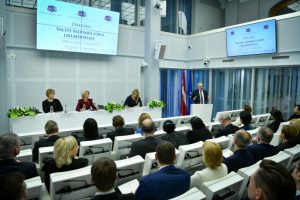Discussion on establishing the Council of State in Latvia
On Friday, 7 February, a discussion, co-organised by the Saeima of the Republic of Latvia (hereafter – the Saeima), the Chancery of the President of the Republic of Latvia and the Constitutional Court, “The Legislative Role of the Council of State” was held. It aimed to initiate sharing of opinions regarding the establishment in Latvia of independent Council of State that would improve the quality of the legislative process and promote sustainability of the state.

Photo: Ilmārs Znotiņš, the Chancery of the President
The discussion was opened by Speaker of the Saeima Ināra Mūrniece. She underscored that the establishment of new institutions always was a very serious matter requiring meticulous assessment. The way this new institution would fit into the existing system, its contribution as well as its way of working, who would represent this institution and its link with the parliament needed to be understood. Ināra Mūrniece recognised that the added value brought by the Council of State – an independent advisory institution – could be its interaction or link with the parliament and society in general throughout the stage of drafting and adopting laws.
In his speech, President Egils Levits drew attention to those article of the Satversme, unwritten principles of law and values that constituted the inviolable core of the Satversme, the foundation of the Satversme. He also underscored that the foundation f the Satversme imposed an obligation upon the legislator to abide by the principle of good legislation and adopt laws that complied with both the letter and the spirit of the Satversme and national sustainability. However, practice shows that this is not always the case, which is also proven by the Constitutional Court’s rulings. The President underscored that Latvia needed an independent institution that would provide not only a legal opinion but also an opinion on the contents of draft laws, well-considered from the sustainability perspective.
President of the Constitutional Court Ineta Ziemele shared with participants her views on the way the institution of the Council of State would fit into the existing Latvian constitutional system. She indicated that the Council of State would be an independent advisor, facilitating early elimination of legislative errors. The Council of State would examine sustainability, impact on society of the proposed legal solution, as well as the way it would fit into the existing legal order. She emphasised that it was of particular importance for Latvia to establish an institution like this now when the states of the world competed globally, therefore Latvia must facilitate the attraction of investors and reinforce its reputation.
Participants of the discussion were addressed also by President of the Finance Department of the Council of State of France Jean Gaeremynck. In his address, he provided insight into the operations of the Council of State in France. Although the opinions provided by the Council of State to the government and the parliament are only advisory as to their form, they play an important role in the creation of legal regulation. Jean Gaeremynck underscored that the Council of State prepared opinions by assessing the compliance of the proposed draft law with the Constitution, the European Union law as well as examining it in interconnection with the case law of the Court of Justice of the European Union and European Court of Human Rights. He also noted that specialists in different fields worked at the Council of State and that the opinions it prepared were publicly accessible.
Justice of the Constitutional Court Gunārs Kusiņš spoke at the discussion, turning to the importance of research in preparing regulatory enactments. He emphasised that the drafting of legal acts should be based on facts, research and reasonable forecasts. Moreover, the statistics of the Constitutional Court’s rulings shows that improvements are needed not only in the legislative process but also in the quality of other regulatory enactments. Gunārs Kusiņš emphasised that the quality of regulatory enactments could not be campaign-like improvements, it required constant attention. He admitted that the solution to the identified problem required full and comprehensive research to select the most effective methods.
Vice-president of the Constitutional Court Sanita Osipova, in turn, spoke about the evolution of democracy and the legislator’s role today. She emphasised that the legislative process, similarly to other processes of the state, was aimed at guaranteed respect for human dignity and fundamental rights. She admitted that contemporary technological development and multi-cultural society constantly required new law, which made the State assume new functions. At present, the legislator must be able to cover more dimensions, work effectively, guarantee peace and public order. It requires new solutions from the State to perform these functions. Participants from all branches of the state power participated in the discussion.
The President’s speech in Latvian is available here: https://www.president.lv/lv/jaunumi/zinas/valsts-prezidenta-egila-levita-runa-diskusija-valsts-padomes-loma-likumdosana-26124
Video recording in Latvian of the discussion is available here: http://video.tiesraides.lv/flv/live/20200207140802_saeima.lv.audio.01.3_0.mp4
The agenda of the discussion is available here: https://titania.saeima.lv/LIVS/SaeimasNotikumi.nsf/0/999fe87661c41194c2258503004b17fd/$FILE/Programma%20Valsts%20padomes%20loma%20likumdosana%2007%2002%202020%20LV%20v03.pdf



